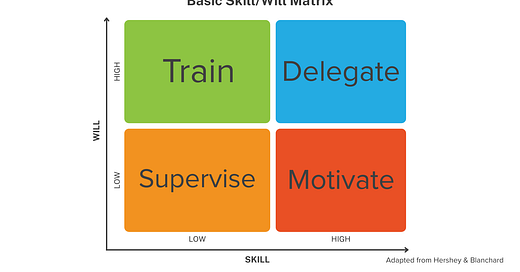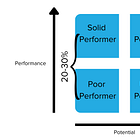TL;DR
You’ve seen it before: TL;DR — “Too long; didn’t read.”
That phrase makes me a little sad. As someone who believes in deep sense-making, I’ve always emphasized authentic practice, close reading, and text-based discourse.
But I also work with school leaders every day—some of the smartest, busiest people on the planet—and I know what you’re up against: constant context-switching, no time to spare, and inboxes that never stop growing.
So I’m trying something new. I’m challenging one of my own mental fossils:
Old Belief: Learning only happens through deep, extended engagement.
New Practice: Learning also happens through repetition, reflection, and bite-sized practice—if it’s intentional.
This isn’t dumbing it down. It’s scaling it up. Let’s see what sticks.
Today’s TL;DR
The Skill-Will Matrix is a relic.
Beliefs shape both skill and motivation.
Coaching without unearthing belief systems is like planting seeds in concrete.
It’s time we start treating mindset excavation as essential—not extra.
The Rise (And Fall) of the Skill-Will Matrix
Let’s talk about the Skill-Will Matrix. You know, that trusty little box that coaches and managers have been since the 70s. On paper, it’s clean and neat:
Low Skill, High Will: Train them.
Low Skill, Low Will: Supervise them.
High Skill, Low Will: Motivate them.
High Skill, High Will: Delegate and get out of their way.
Boom. Sorted.
Except… it’s not. If you’ve ever coached in a high-stakes environment—a school, a hospital, a courtroom, a nonprofit under siege—you’ve probably looked at that cute little quadrant and thought, “This isn’t helping.”
Because the real problem isn’t about skill. Or will.
It’s about fossils.
More on matrices:
Mental Fossils in the Coaching Matrix
Let’s say you’ve got a teacher who isn’t implementing the new curriculum. The Skill-Will Matrix tells you: She has the skills, she just lacks will. Motivate her! So you go all in—pep talks, incentives, a laminated list of why the new curriculum is awesome.
But what if the issue isn’t motivation? What if it’s a belief fossil?
“I’ve taught my way for 20 years and my kids always succeeded.”
Or...
“This curriculum wasn’t made for my students.”
Or the quieter fossil:
“I’ll never be as good at this as I was before.”
You can’t motivate a fossil. You have to excavate it.
The False Binary of Skill and Will
Skill and will are not independent variables. That’s a coaching myth we need to lay to rest.
Skill grows when people feel safe, capable, and valued.
(Hi, psychological safety, nice to see you.)Will grows when people feel competent, not judged.
(Thanks, Daniel Pink—Drive still slaps.)
But when someone believes “I’m not cut out for this”, both their skill and motivation tank. You can hand them a PD packet and a cup of coffee, but unless you get under the surface, you’re just putting fresh paint over cracked drywall.
Fossilized Thinking in Education
In schools, outdated beliefs don’t just linger—they harden into habit. Over time, they calcify into policies, schedules, and norms we stop questioning.
“Our families won’t show up.”
So we plan events without their input, hold meetings at times they can’t attend, and then use their absence as proof they’re disengaged.“These kids can’t handle grade-level work.”
So we water down the curriculum, focus on compliance over cognition, and unintentionally widen the gap we claim to be closing.“If I don’t manage every second, I’ll lose control.”
So classrooms become rigid and over-scripted, crowding out student voice, curiosity, and authentic learning.
These aren’t just throwaway comments. They are belief fossils—once protective, now restrictive. They show up in teacher coaching, team meetings, and school improvement plans every single day.
Until we name them, we can’t disrupt them.
So What Do We Do Instead?
We move from Skill + Will to Belief → Behavior.
No matter how many strategies you teach or how well you cheerlead, disempowered beliefs will always win. They override skill. They suffocate motivation. They are the reason talented people stay stuck.
What if instead of asking:
“How can I build this person’s skills?”
You asked:
“What belief is keeping this skill from taking root?”
That’s where real coaching begins. With a chisel, not a matrix.
Some questions to start some discussion:
Have you ever misdiagnosed a performance issue as a “skill” problem when it was actually a belief issue?
Can you think of a time when you resisted change—not because you lacked skill, but because it challenged your identity or values?










Check out the Systems Iceberg Model! The 'fossils' are mental models.